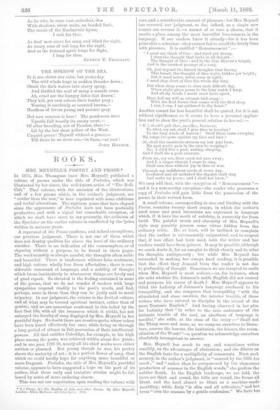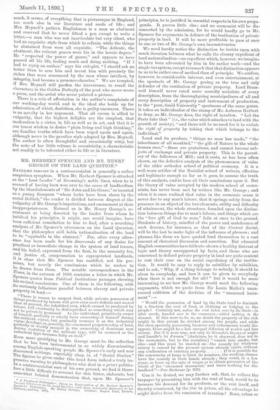BOOKS.
MRS. MEYNELL'S POETRY AND PROSE.* IN 1875, Miss Thompson (now Mrs. Meynell) published a volume of poems under the title of Preludes, which was illustrated by her sister, the well-known artist of "The Roll- Call." That volume, with the omission of the illustrations, and of a few poems which, in the author's judgment, are "cruder than the rest," is here reprinted with some additions and verbal alterations. The eighteen years that have elapsed since the appearance of Preludes have not been poetically productive, and with a signal but remarkable exception, of which we shall have more to say presently, the criticism of the Spectator on the earlier volume is unaffected by the lyrics written in maturer years.
A reperusal of the Poems confirms, and indeed strengthens, our previous judgment. There is not one of them which does not display qualities far above the level of the ordinary versifier. There is no indication of the commonplace, or of rhyming without a purpose, to be found in these pages. The workmanship is always careful, the thoughts often noble and beautiful. There is tenderness without false sentiment, and high culture wholly free from affectation ; there is con- siderable command of language, and a nobility of thought which turns instinctively to whatsoever things are lovely and of good report. So elevated is the feeling contained in some of the poems, that we do not wonder if readers with large sympathies respond readily to the poet's words, and find, perhaps, more in them than they can be justly said to merit as'poetry. In our judgment, the volume is the fruit of culture, and of what may be termed spiritual instinct, rather than of genius; and we are somewhat confirmed in this belief by the fact that life, with all the treasures which it yields, has not enlarged the faculty of song displayed by Mrs. Meynell in her youthful days. No doubt there are creative poets, whose voices have been heard effectively but once, while living on through a long period of silence in full possession of their intellectual powers. All that entitles Coleridge, for example, to his high place among the poets, was achieved within about five years ; and in one year, 1797-98, nearly all his chief works were either written or planned. But young though he was, his poetry shows the maturity of art ; it is a perfect flower of song, than which we could hardly hope for anything more beautiful or more fragrant. Preludes, the title of Mrs. Meynell's youthful volume, appears to have suggested a hope on the part of its author, that these early and tentative strains might be fol- lowed by notes of more enduring charm.
This was not our expectation upon reading the volume with
(1.) Poems. (2.1 The INtion of Life, and other Essay, By Alice Meynell. London: Elkin Mathowa and Jolla La:13. 1503.
care, and a considerable amount of pleasure ; but Mrs. Meynell has reversed our judgment, so far, indeed, as a single new sonnet can reverse it,—a sonnet of so rare a charm, that it merits a place among the most beautiful love-sonnets in the language. If our readers know it already—for it has been printed in a selection—they cannot fail to recall the lovely lines with pleasure. It is entitled "Renouncement" :—
" I must not think of thee: and tired yet strong, I shun the thought that lurks in all delight—
The thought of thee—and in the blue Heaven's height,
And in the sweetest pAssag,e of a song.
Oh, just beyond the fairest thoughts that throng This breast, the thought of thee waits, hidden yet bright ; But it must never, never come in sight ;
I must stop short of thee the whole day long.
But when sleep comes to close each difficult day, When night gives pause to the long watch I keep, And all my bonds I needs must loose apart,
Must doff my will as raiment laid away,—
With the first dream that comes with the first sleep I run, I run, I am gathered to thy heart."
Another sonnet far less beautiful shall be quoted, for it is not without significance, as it seems to have a personal applica- tion and to show the poet's present relation to her art :-
' If I should quit thee, sacrifice, forswear,
To what, my art, shall I give thee in keeping ? To the long winds of heaven ? Shall these come sweeping My songs foragene against my face and hair ?
Or, shall the mountain-streams my lost joys bear,
My past poetic pain in the rain be weeping ?
No; I shall live a poet, waking, sleeping, And I shall die a poet unaware.
From me, my art, thou canst not pass away ; And I, a singer though I cease to sing, Shall own thee without joy in thee or woe.
Through my indifferent words of every day, Scattered and all unlinked the rhymes shall ring And make my poem; and I shall not know."
We may add that, with the exception of "Renouncement "- and it is a noteworthy exception—the reader who possesses a copy of Preludes will gain little from the possession of the poems in their revised form.
A small volume, corresponding in size and binding with the Poems, contains twenty short essays, in which the author's good sense and good intentions are expressed in language which, if it have the merit of subtlety, is assuredly far from lucid. The painful strain and obscurity of Mrs. Meynell's style may possibly possess some virtue hidden from the ordinary critic. He, at least, will be inclined to complain that the author is unreasonably enigmatical, and to suspect that, if less effort had been used, both the writer and her readers would have been gainers. It may be possible, although we much doubt it, for an essayist to think clearly and to utter his thoughts ambiguously ; but while Mrs. Meynell has succeeded in making her essays hard reading, it is possible that the effort they demand from the reader is not due to profundity of thought. Sometimes we are tempted to smile when Mrs. Meynell is most serious,—as, for instance, when she asks whether Dr. Johnson's noble English did not control and postpone his terror of death P Mrs. Meynell appears to think the Latinity of Johnson's language conduced to his tranquillity, and she compares that tranquillity "with the stimulated and close emotion, the interior trouble, of those writers who have entered as disciples in the school of the more Teutonic English." And having observed in her plea for Latinity that "in order to the sane endurance of the intimate trouble of the soul, an aloofness of language is needful," she adds, at the close of the essay :—" Shall not the Thing more and more, as we compose ourselves to litera- tare, assume the honour, the hesitation, the leisure, the recon- ciliation of the Word ?"—a question we acknowledge ourselves absolutely incompetent to answer.
Mrs. Meynell has much to say, and sometimes writes sensibly, on the advantages of abstention ; and she dilates on the English taste for a multiplicity of ornaments. Even park scenery, in the author's judgment, is "marred by the little too much ;" and "rather than be overpowered by the clamorous production of summer in the English woods," she prefers the subtler South. In the English landscape, we are told, the trees are thick and round, the hills are round, the forms all blunt, and the land almost as blunt as a machine-made moulding; while Italy "is slim and all articulate," and her trees "own the seasons by a gentle confession." We have too much, it seems, of everything that is picturesque in England, too much also in our literature and mode of life ; and Mrs. Meynell's pattern Englishman is a man so abstinent and reserved that he never lifted a pen except to write a letter,—a man who was not inarticulate but very silent, who had an exquisite style from which to refrain, while the things he abstained from were all exquisite. "The delicate, the abstinent, the reticent graces were his in the heroic degree." He "respected the power of pause," and appears to have paused all his life, feeling much and doing nothing. "If I had to equip an author," says his eulogist, "I should ask no better than to arm him and invest him with precisely the riches that were renounced by the man whose intellect, by integrity, had become a presence-chamber." We are tempted, if Mrs. Meynell will pardon the irreverence, to recall the characters in the Golden. Butterfly of the poet who never wrote a poem, and the artist who never painted a picture.
There is a vein of affectation in the author's complaints of our working-day world, and in the ideal she holds up for admiration, of which, doubtless, she is guilty unawares. There is no novelty in her argument. That all excess is allied to vulgarity, that the highest delights are the simplest, that moderation is a virtue in life as well as in art, and that it is our truest wisdom to desire "plain living and high thinking," are familiar truths which have been urged again and again, although never in the peculiar style adopted by Mrs. Meynell. The author is often thoughtful and occasionally witty, but the note of her little volume is eccentricity, a characteristic not readily to be tolerated either in life or in literature.



































 Previous page
Previous page